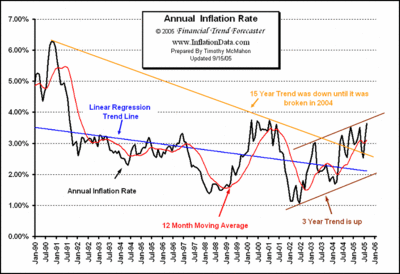Inflation
A storm may be gathering. I say may, because I'm no economist. One of the benefits of all the greyhair is that I've been around a little while and have seen some patterns to life.
Sometimes that means I know enough to be dangerous. But, here it goes anyway.
One of the patterns that I fear is occuring is a repeat of the 1970's stagflation. Stagflation is the combination of two elements, high inflation and high unemployment. There has been a recent combination of events and data that make me think this. The first is this:

The above chart is the CPI, or Consumer Price Index. As has been nicely drawn on the chart for us, the inflation rate is rising and the technical trends are upward. Inflation is still relatively tame, but it's all over CNBC that business is starting to factor price increases into their forecasts to protect against inflation.
Then, there's this from Business Week:
With no significant fresh economic data out, the market was still focused on Dallas Fed Bank President Robert Fisher's remarks Tuesday that inflation was nearing the high end of the Fed's comfort zone -- a clear signal that the Fed's short term interest rate hikes would continue.The Fed has been obsessed with not having a reoccurence of inflation. After the 70's, it took a concerted effort by then Fed chairman Paul Volcker to break the back of runaway inflation. I remember buying a home when 30 year mortgage rates were 17%! The inflationary spiral began when energy prices went through the roof, or so we thought then. That sent a price ripple through the economy despite slowing growth. We were much more dependent on energy then than now, but the economy still runs on petroleum.
Essentially, Volcker raised interest rates to a level that broke the economy, resulting in a serious recession that finally sent inflation on the way down. I think the current Fed remembers this and will act accordingly. What this means is that despite a slowing economy, the Fed will continue to incrementally raise interest rates until it is satisfied that inflation is under control. Even if it means unemployment.
In terms of economic slowdown, we have this. Consumer confidence has tanked. This is important because the current economy is completely dependent on consumer spending. If the consumer stops buying, the GDP drops and a recession begins. And it looks a bit like this:
Today's Non Manufacturing ISM data dropped to the lowest level in 2 years. At the same time, the prices paid index spiked to the highest levels ever or at least, since ISM began surveying non-mfr businesses in July 1997.This sounds like layoffs with higher prices to me.
This suggests a considerable slowdown in the Service sector, which itself accounts for ~90% of the US economy. Further, as we noted last year in Double Squeeze: Between a Rock and a Hard Place, firms are finding it increasingly difficult to pass along price increases -- setting us up for a margin and earnings squeeze.Translated: Lower earnings equals a tanking stock market, higher unemployment, and reduced wealth.
A moderately slowing economy could be good news in a way. If people are spending less, supply increases and inflation heads down. Right? Except if consumer behavior is like the 70's. I can remember a land rush of purchases made by people because of a fear of price increases. If inflation gains a foothold people may begin to feel a need to make purchases as a hedge. For example. If car prices are likely to go up, say, 15% over the next year, an individual may move up that purchase to combat the increase in price. This artifically increases demand for a time, fueling inflation. The Fed then raises interest rates higher, causing more artificial demand yet slowing growth.
Eventually the cycle has to break...and when it does it's not pretty. As is usual, the biggest victims are further down the economic ladder. In fact, some wealthy individuals did quite well, buying 30 year treasury bonds at 18%! Some are maturing about now. Hey, maybe that's why Bush seems to be determined to destroy the economy? :)
Finally. Consumers can respond to price increases by decreasing demand in most areas. But who can forego food or gasoline? Sure, everyone can conserve and be more frugal. But there's a point at which increased prices just have to be absorbed. At that point, demand does not decrease, growth slows, while prices continue to increase. This is an essential element of stagflation.
Also consider this. In the 70's, oil prices rose artificially due to OPEC, not due to excessive demand. When prices increase outside the demand cycle is when you throw the business cycle rules out the window. Current high oil prices are driven by natural disaster (short term) and peak oil (long term), meaning that prices have to increase regardless of demand or growth.
Are we headed for a decade of economic turmoil and stagflation? I don't know for sure. But if it walks like a duck and quacks, well,...you gotta wonder.

1 Comments:
How depressing, especially for those of us who live paycheck to paycheck.
Post a Comment
<< Home